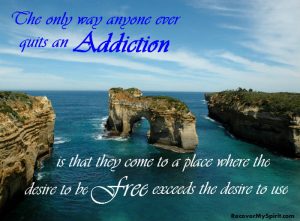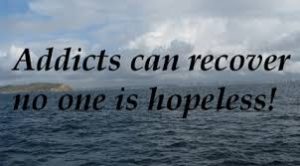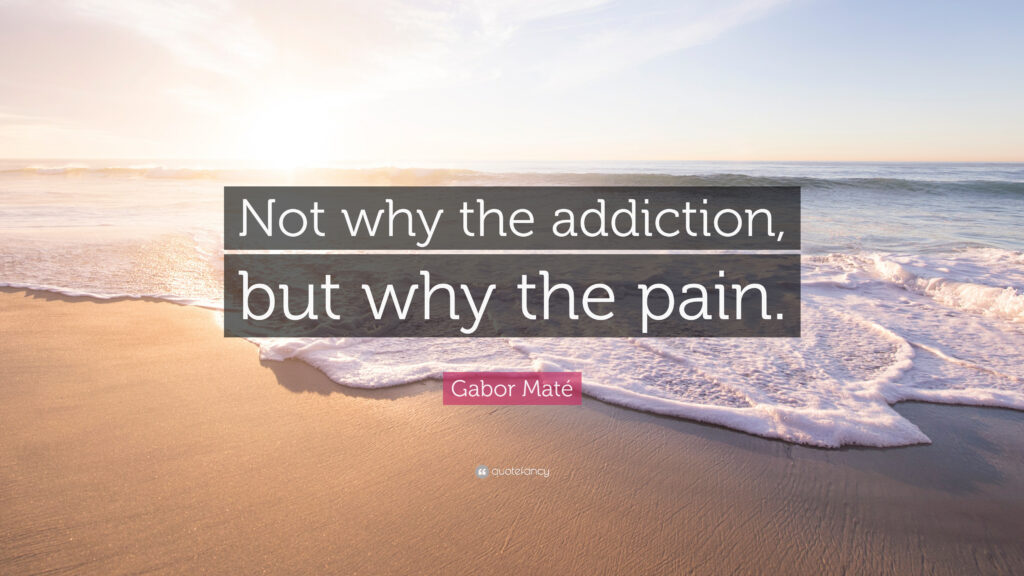What do we mean when we talk about addiction and recovery?
Ask any group of medical professionals and you will soon realise that there are many personal understandings, and definitions, of what addiction really is …. and of what we mean when we talk about recovery!
Reviewing the literature also produces a wide variation of an understanding of addiction, with many different definitions!
Historically, we have been led to believe that many chemicals and behaviours are, or can be, addictive, e.g. Alcohol, Cocaine, Marijuana, Heroin, Nicotine, Methamphetamine, Benzodiazapines, Prescription Drugs, Gambling, etc. …. but what about Food, Exercise, Money, Work, Shopping, Internet, Religion, Gaming, Sports, Sex and Other Behaviours & Activities …. can we also be become addicted to these!
Is it the chemical, the behaviour or the activity that is addictive …. or do we, as humans, carry the source of the genesis of our own addictions!
From the moment of our conception we are exposed to the traumas, stresses and injuries experienced by our mothers and then we are subjected to the trauma of our birth …. being forced, and compressed, through a tube from a safe, warm, protected environment into an alien world full of noise, temperature variation, strange sounds and confusion! ….or being physically removed from our mother’s womb by a traumatic surgical intervention!
After birth, we are exposed to life in the world …. a world which is alien to our survival, a world in which we are powerless to help ourselves immediately, and for some years after birth, a world in which we are totally dependent on our mothers and fathers, or other carers, to provide for our physical, emotional and psychological well being.
In early childhood we observe and internalise the behaviour of our parents / carers …. we observe how they deal with stress, how they respond to the challenges of life, how we are nurtured, or not as the case may be, how they interact with other family members …. and with society.
How we are modelled in those first few years of life will determine how we will deal with, or not deal with the challenges in life, our emotions in life, and how we will react to positive and negative challenges later in life …. but remember …. our parents had to survive the same processes of life when they were young and vulnerable, and those experiences modelled their capacity to look after their children …. and so back through the generations.
Our parents were not ‘perfect’, nor were their many previous generations of parents …. from this we can understand that we could not have had a ‘perfect childhood’ …. by the nature of human life, we have been emotionally wounded and subjected to physical, psychological and emotional traumas during our childhood …. despite the best of intentions of our parents or carers!
We are all wounded and damaged to some degree …. we are not perfect …. we are emotionally and psychologically imperfect …. that is the population wide effect of trauma in childhood … and of being human!
Trauma is not restricted to negative experiences : it refers to any set of events that, over time, imposes more pain on the child than he or she can process and discharge.
Therefore, trauma can occur, not only when bad things happen, but also when the parents are too stressed, too distracted, too depressed, too anxious, too beset by economic worry, too isolated, too connected to their mobile phone, etc. to respond to a sensitive child’s emotional need to be seen, emotionally held, heard, validated, made to feel loved and secure.
Such is the reality behind many stories of a ‘happy childhood‘: the denial of one’s pain, the splitting of distress from our conscious memory, is one of the outcomes of trauma.
It is not the many traumas, physical, emotional or psychological, that we experience that matter …. they may matter in the physical sense …. it is the accumulated effect within us of childhood traumas that makes us vulnerable to being addicted in later life …. it is what happens inside of us as a result of trauma!
The effects of trauma can disable our ability to deal with the challenges of life as we advance in years to the extent of causing such distress and emotional pain that we seek to reduce, and sometimes eliminate, that emotional, or physical, pain by a chemical, a behaviour or an activity.
It is now thought that addiction is due to a dysregulation, or maladaptation, of our emotional responses in life, caused by changes in the stress control circuits in our brains.
It is not a disease caused by an abnormality in our genes, or in our brain circuitry, but rather a ‘dys-regulation, dis-ease, sickness or malady‘ where the genes we have inherited have been epigenetically modified by the effects of the traumas that our parents have suffered …. and by trauma we experienced in utero and in childhood.
Science is now showing that addiction is not genetically transmitted …. but we may have a genetic vulnerability through the expression of our genes in response to the challenges of life …. because of modifying ‘epigenetic flags’ attached to our genes!
Epigenetics is the study of heritable and stable changes in gene expression that occur through alterations in the chromosome, rather than in the DNA sequence.
Despite not directly altering the DNA sequence, epigenetic mechanisms can regulate gene expression through chemical modifications of DNA bases, and changes to the chromosomal superstructure in which DNA is packaged. Three different epigenetic mechanisms have been identified: DNA methylation, histone modification, and non-coding RNA (ncRNA).
Science is also showing that we can change the way we feel when challenges arise and that, given the plasticity of our brain, the stress control circuitry can be changed …. and recovery, through healing, is possible.
We need not be imprisoned, and controlled, by our addictions …. we can heal the effects of the traumas we experienced in childhood and early life.
What was life like for you in your childhood?
Did you always feel loved and secure …. or can you recall emotional distresses, feelings of insecurity, of not being good enough, of parental abandonment, of having unrealistic expectations put on you, of a lack of love and attachment, of chaos and confusion within the family, physical trauma and abuse?
Where, as a child, did you fit into the family dynamic …. Hero, Scapegoat, Joker, Lost Child?
Did you experience stress and trauma between parents, parental divorce, life with parental addiction, life with a parent who was an adult child of an alcoholic/addict …. did you feel that you always mattered?
How many of us have said as we were growing up …. ‘I will never be like my parents! I will not treat my children, or my spouse / partner, in the manner that my parents and family treated me! I will not hit, abuse, or argue with anyone!’?
By being rigorously honest, we can all recall distressing moments and experiences from our childhood, which have moulded how we respond to the challenges of life, other people, and how we view the world!
Owning these experiences, sharing them with trusted friends or therapist, actively changing how we react to situations, bringing them out from under the clouds of associated shame, guilt and fear, being gentle with ourselves and having some self compassion will enable us to live a life without the need to use a chemical, a behaviour or an activity to change the way we feel and to heal the wounds of childhood trauma!
Addiction gave us a release from the anxieties, and emotional distresses of the challenges we were facing, oblivion from the pain we were experiencing, and a perceived sense of well being!
We were not addicted to the chemical, the behaviour or the activity …. we were addicted to the soothing feelings generated by the neurotransmitters produced by the chemical, the behaviour and/or the activity …. we were unable to cope with what we were feeling, which was a reaction to our life circumstances at that time!
What we did not recognise was the damage we were doing to ourselves, to our partners, our children, other family members and to everyone with whom we came into contact …. we had all to recover from the damage and wounds of our addiction.
Addiction is a family sickness …. it is not all about the addicted person …. the addict contaminates everyone, every Institution and every interaction with whom he / she has contact …. spouse / partner, children, parents & siblings, extended family & in-laws, friends, employer, colleagues, patients, GP Medical Services, Hospital Consultations & treatments, Police, Regulators – GMC/GDC, Medical / Dental Protection Organisations, rehabilitation facilities, counselling, legal costs, divorce costs, re-homing costs, child maintenance costs, etc. …. the list is nearly endless!
All people suffering with addiction will have experienced adverse childhood experiences but not everyone who has experienced adverse childhood experiences will suffer with addiction!
The question is not …. ‘Why The addiction?’…. but is …. ‘Why The Pain?’ …. and ‘What Happened To You?’ …. and sometimes more importantly, ‘What Didn’t Happen To You?’.
Ask anyone in active addiction, or in recovery, ‘What Did The Chemical, Behaviour or Activity Give You?’ …. the answer will be most likely be one of the following:
It helped …. to cope with work : to relax : to sleep: to achieve oblivion : to be more confident : to feel like how other people looked : to escape from life : to be socially accepted : to block memories of childhood : to shut out the past : to remove anxieties : to feel better about life : to take the pain away …. or something very similar!
We are adult children of alcoholic, addicted or dysfunctional families who have used chemicals, behaviours or activities to reduce, and sometimes eliminate, the pain from the effects of the physical, emotional or psychological traumas that we experienced from parents, and carers, in early life, and until we we were able to look after ourselves!
Maybe we need to reconsider the terms ‘alcoholic’ and ‘addict’ in describing who we are …. and consider an addict / alcoholic as someone who has experienced, physical, emotional or psychological trauma in childhood resulting in a dysregulation, or maladaptation, of their emotional responses, due to changes in their stress control circuits.
Recovery is sobriety …. plus a healing journey of discovery to find who we really are …. and not who we think we are expected to be!
In ‘The Realm of Hungry Ghosts’, Gabor Maté describes addiction as “…. not a choice, nor is it a moral failure, an ethical lapse, a failure of will or an inherited brain disease …. it is actually a response to human suffering …. it is an attempt to temporarily escape suffering!”
………………………………………………………………………………………………………………………………………
‘What Happened to You?: Conversations on Trauma, Resilience, and Healing’
“What I’ve learned from talking to so many victims of traumatic events, abuse, or neglect is that after absorbing these painful experiences, the child begins to ache. A deep longing to feel needed, validated, and valued begins to take hold. As these children grow, they lack the ability to set a standard for what they deserve. And if that lack is not addressed, what often follows is a complicated, frustrating pattern of self-sabotage, violence, promiscuity, or addiction.”
………………………………………………………………………………………………………………………………………
Gabor Maté:
‘Addiction is any behaviour that a person craves, in which a person finds temporary relief or pleasure but from which suffers negative consequences, and yet has difficulty giving up.’
In brief: craving, relief, pleasure, suffering, impaired control.”.
In The Realm by Of Hungry Ghosts, Gabor Maté, p181: ‘The expression of genetic potentials is, for the most part, contingent on the environment’. Genes do dictate the basic organisation, development schedule and anatomical structure of the human central nervous system, but it’s left to the environment to sculpt and fine tune the chemistry, connections, circuits, networks and systems that determine how well we function.’
- ‘Human Development Through The Lens Of Science and Compassion’
- ‘The Misunderstanding Of Trauma By Society And The Medical Industry’
- ‘Inherited Family Trauma’ : Mark Wolynn with Lynn Fraser
- ‘Inherited Family Trauma’ : Mark Wolynn with Sheleena Aiyana
Bruce D Perry:
- ‘Trauma, Resilience, and Healing!’ : Brené Brown with Oprah Winfrey & Bruce D. Perry, MD PhD
- ‘What Happened to You?’ : Oprah Winfrey & Dr Bruce D. Perry MD PhD with Rob Low
- Bruce D Perry – Quotes from ‘Good Reads’
Bessel Van Der Kolk:
Adult Children of Alcoholics / Dysfunctional Families – UK
Karina Margit Erdelyi: HealthCentral August 2022
National Library of Medicine …. www.ncbi.nim.nih.gov/booksNBK532999
Genetics, Epigenetic Mechanisms – Nora M. Al Aboud; Connor Tupper; Ishwarlal Jialal’.
‘Epigenetics & Inheritance’ – Learn.Genetics, Genetics Science Learning Centre.
……………………………………………………………………………………………………………………………………………………..


